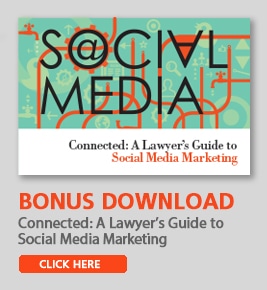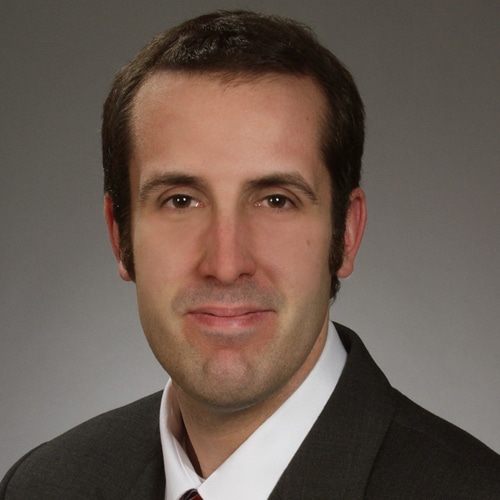Let’s run down some common misconceptions about social media, and rotate the conversation.
Misconception 1: “Oh No, My Privacy!”
Revision: Connect Widely
Now, in case you hadn’t heard, this is social media. If you’re using it to market your business, you’ll want as many people to see what you’re doing as you can corral. I understand if you want to have private accounts, where you don’t post work-related items, or where you can finally say what you really mean. But, if your intention is to generate clients and referrals of clients, and you want to leverage private accounts, you’re better off not having any social media profile at all, since you’d then be unwilling to publicize it. I mean, what do you have to hide? Posts about a recent Supreme Court decision, and its impact on your clients and potential clients? Dear me! If you’re worried about personal or limited-release messages, avoid the included inbox and use email instead, like any normal person would. Connections have intrinsic value. Connections expand your reach. Acquire as many of them as you can, by going public.
Misconception 2: “I’ve Got to Be on There All the Time, Right?”
Revision: Schedule Dutifully
Of course not. I mean, you can be; but, really, that is going to destroy your productivity. The idea of the perpetual Internet participant is a myth. No one can be “on” all the time, nor should they be. It has always been the case that quality trumps bulk, so go for fewer, higher quality posts. Do make regular posts, but schedule them. Block out time to respond to connections, and to review new information to post. Schedule posts for the weekend, but spend that real time offline.
Misconception 3: “I Can’t Manage One More Thing”
Revision: Oversee Intermittently
Managing a law firm, in a lot of ways, is like a slow death from a thousand cuts. There are so many little things to manage that they mass to form one big thing. So, yeah, block your time, and use a scheduling tool to set up posts days and weeks ahead. I use HootSuite; Gyi Tsakalakis lists a number of other, similar tools here.
Misconception 4: “I’m Just Gonna Get Lost in the Shuffle”
Revision: Repeat Regularly
If you feel less like a card in the shuffle, and more like a microbe in a tidal wave, making regular posts, at determined intervals, will likely improve your outlook, and impress upon the outlook of others. Two major strategies are as follows: Post your new content, then post it again. Post your old content, then post it again. Rinse and repeat. Staying “top of mind” equals continually reminding people of your existence, and holding out, preferably in a form that is not overtly salesy, is the singular touchstone for effective marketing. Nor do folks much mind — there’s so much information flowing through their social media channels, they won’t notice whether it’s your first duplicative post, or your fifth. Sprinkle in content from other experts in your field, to even it out.
Misconception 5: “It’s All Selfies, and Work-from-Home Adverts”
Revision: Discover Contently
When Queen Elizabeth II is photobombing selfies, I’d say we’ve jumped the shark. (Actually, that’s kind of awesome, and I take it back: Do your thing, QE2.) But there is actually useful content online as well. You’ll have to trust me on this one. Even if social media is almost never the primary publication tool (usually that’s a blog), it’s often the primary dissemination tool. The trick here is to dive into the content stream in a certain area, and figure out who the active experts are. Aggregate them, in some fashion, so that you become aware of their posts, and repost what they write, in your stream, which will also include your own content, which is then perceptually improved by association. Hashtags and lists can be useful for discovering the right people.
Misconception 6: “I Don’t Want to
Blog, or Microblog, or Blawg”
 Revision: Curate Effectively
Revision: Curate Effectively
Content marketing is in vogue, especially for lawyers, and it makes sense. It’s a way to broadcast expertise, which is what attorneys have been using as a lynchpin of their marketing since the Stone Age (or at least since the late 1970s). And, much of the effectiveness, or lack of effectiveness, of your social media presence will be built on the relative strength of your content management protocol — that is, your ability to curate consistently excellent content. Take the time to get it right, especially since by introducing, and reintroducing, others’ content, they’re more likely to return the favor. If you begin to influence the influencers, then that’s when you can invade their class.
Misconception 7: “Oh, Great, More Internet Weirdos and Losers”
Revision: Develop Professionally
I guess nerds are cool now, or at least mainstream — well, at least they’re rich. While the Internet is filled with freaks, certainly, that designation does not represent the totality of the population. There are plenty of persons invested in creating and maintaining online personae that match the professionalism they impart to their offline dealings. Many of these folks are other lawyers — or, at least, are people other lawyers want to interact with. This is mostly a matter of vetting. So, the thrust here is that you want to figure out who is worth following, and who isn’t. Most of the time, it’s pretty easy to figure out who is a legitimate businessperson. Avatars are a major tell, as are bios. The interesting thing about social media is that while it imparts to you a basically unlimited network, you really define the value of that network when you limit it to other professionals from whom you could secure referrals.
Misconception 8: “That’s Not Going to Make Me Any Money”
Revision: Not Directly
It’s a long run, as with any other form of marketing. You’re not going to create a social media profile, or four, and just sit down to watch the phone ring — or, more appropriately perhaps, the email pile up. One pipeline flows into another (you push your blog posts through your social media channels, for example), such that you’re never operating your marketing in silos. What clients and referral sources see is the combination that represents your business profile. You may never find out, and your connection may not even recall, what it was that pushed them over the top of making a referral, or engaging your services; but, it’s likely that it was a combination of things, including your web presence. If you divvied up every dollar you made, percentages would likely be allocated to your various offline and online activities. We’re not talking about a magic bullet here, but then we never are.
Misconception 9: “It’s an Ethics Minefield, Hoss”
Revision: Not Exactly
To put it bluntly, many of the more garish ethics errors attorneys make that are related to marketing and technology are rooted in a lack of common sense. The battleground of much of modern legal ethics analysis surrounds real-time interaction, and that is likely what scares many attorneys away from social media. But, it is a rarer occasion than you might think when potential clients are trolling for your business in a public, online forum.
Many potential clients still maintain a sense of decorum and circumspection, and will find their way to your website contact form, or your phone number — and you can direct them there, too. List your jurisdictional limitations. Include truncated disclaimers. Don’t discuss your clients’ legal issues in online public fora. Your activities as a wannabe ostrich might even include the use of social media profiles solely as content aggregators for your various productions, and nothing more. Though, if you’re using your social media profiles most effectively, you’re spending your time engaging with potential referral sources, and directing (or having them direct) clients and potential clients to more appropriate, alternative spaces.
Misconception 10: “I’ve Got Far More Important Things to Do”
Revision: Well, Admittedly
Tell me about it. Being online all the time is lame. I mostly blame the Internet; but, if we’re parsing out the blame pie, we’re also sort of too weak (or too encumbered, in many circumstances) to truly become disengaged. So, we have to commandeer our wills, and apply rigid time management and task management protocols, including, among other things, blocking out time and adhering to the tenets of a marketing plan.
Jared Correia is Assistant Director and Senior Law Practice Advisor at the Massachusetts Law Office Management Assistance Program. Prior to joining LOMAP, he was the Publications Attorney for the Massachusetts Bar Association. Before that, he worked as a private practice lawyer. Jared is the author of “Twitter in One Hour for Lawyers.” He writes regularly on practice management for Attorney at Work, and for the LOMAP blog here. Find him on Twitter @JaredCorreia.
Note: This article is based on a presentation originally designed for Andrea Cannavina and The Legal Connection. The presentation and podcast are available (for free).
Need a Marketing Checkup?
Jared Correia will be presiding at the Massachusetts Law Office Management Assistance Program’s “5th Annual Super Marketing Conference: Social Marketing Strategies,” on June 4 in Boston. Click here to learn more about the all-day program. (Attorney at Work is proud to be a Media Sponsor.)
Sponsored Links
»Get Your Annual Marketing Check-up: 5th Super Marketing Conference, June 5, Boston.
»Learn more about the way attorneys get paid. Free trial.
»Need new client development ideas? We’re here to help.
























